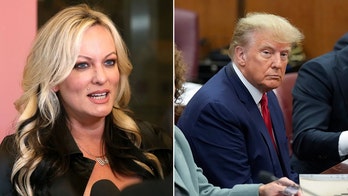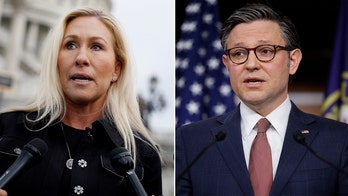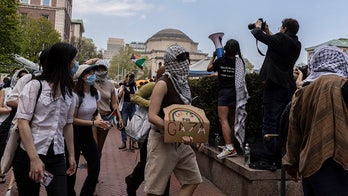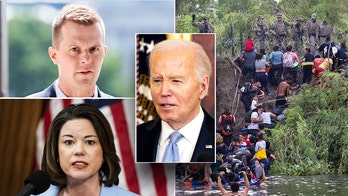Trump and Pelosi clash in wake of impeachment acquittal
House Speaker accuses the president of looking 'sedated' at State of the Union; Fox News contributor Liz Peek reacts.
Humorist Will Rogers may have summed it up best.
“All I can say for the United States Senate is that it opens with a prayer and closes with an investigation,” he said.
Support it or not, the Senate just completed a rancorous impeachment trial. Now, President Trump has been contesting whether House Speaker Nancy Pelosi, D-Calif., truly prayed for him, as she often has intimated at her weekly news conferences.
Harvard professor Arthur Brooks delivered the keynote speech at the National Prayer Breakfast in Washington the day after the trial concluded. Brooks asserted Washington was gripped by a “crisis of contempt and polarization.” He urged those in attendance to “love your enemies.”
But, speaking at the same breakfast, Trump was having none of it.
“I don’t know if I agree with you,” the president told Brooks and those assembled at the prayer breakfast.
First, Trump couldn’t contain his enmity for Sen. Mitt Romney, R-Utah, the sole Republican senator who voted to convict him on one article of impeachment.
In his floor speech announcing he’d vote to convict the president, Romney observed that at the outset of the trial, senators “swore an oath before God to exercise impartial justice. I am profoundly religious. My faith is at the heart of who I am. I take an oath before God as enormously consequential.”
Romney added that his “promise was before God.” He wasn’t beholden to Trump or the rest of the Senate Republican Conference – despite efforts by colleagues to persuade the Utah Republican to acquit Trump.
Yet, there at the National Prayer Breakfast, the president hectored Romney for speaking about his faith when deciding how to cast his votes in the trial.
“I don’t like people who use their faith as justification for doing what they know is wrong,” Trump said.
Pelosi was seated a few spots away from the president.
TRUMP TAKES ON 'RADICAL LEFT' IN DEFIANT STATE OF THE UNION
“Nor do I like people who say ‘I pray for you’ when you know that is not so,’” Trump added, referring to the speaker’s intercessions on his behalf.
Back at the Capitol that same morning, Pelosi railed against Trump for contesting how Romney and the speaker both said they turned to faith.
“Whatever he said, it was just so completely inappropriate,” Pelosi said of Trump, “especially at a prayer breakfast.”
But then, it was Pelosi who called into question whether “the president understands prayer or people who do pray.”
She reiterated that she prayed “hard for him, because he is so off the track of our Constitution, our values, our country.”
The California Democrat noted she would continue to “pray for him, and I do so sincerely and without anguish.”
And, just as Trump challenged the sincerity of the speaker, Pelosi wondered about the president, too.
“He’s talking about things he knows little about: faith and prayer,” Pelosi said.
Someone who has known something about faith and prayer: Senate Chaplain Barry Black. Prayer permeated Trump’s impeachment trial on a daily basis. Many TV networks took in the daily invocations delivered by Black, live on the air. In his nearly two decades as Senate Chaplain, Black has been known for infusing daily prayers, which have opened Senate sessions, with devotionals related to the business at hand on the floor.
On the day the Senate received the articles of impeachment from the House, Black prayed that the Lord would “strengthen our lawmakers for their journey. Prepare them for the ravages of the valley and the chill of the mountain summits.” The next day, Black prayed that God would guide “our lawmakers to make right choices in challenging times.” On the first formal day of arguments at the trial, Black prayed that God would grant “wisdom to the distinguished Chief Justice John Roberts as he presides.” He noted that since senators had “become jurors, remind them of Your admonition in 1 Corinthians 10:31, that whatever they do should be done for Your Glory. Help them remember that patriots reside on both sides, of the aisle. That words have consequences.”
Black also prayed for “civility” during the trial.
On January 24, Black prayed that senators would “respect the right of the opposing side to differ regarding convictions and conclusions. Give them the wisdom to distinguish between facts and opinions without lambasting the messengers.” In the lone Saturday session of the Senate trial, Black prayed that “we trust the power of Your prevailing providence to bring this impeachment trial to the conclusion You desire.”
On the following Monday, Black had two nuggets for senators. He observed the death of Kobe Bryant and his daughter Gianna, and, later, noted that it was the birthday of Roberts.
“As this impeachment process unfolds, give our senators the desire to make the most of their time on Earth,” Black said.
Black also prayed for God to “guard us from those who smile but plan evil in their hearts.”
As the trial moved tilted toward its final stages, Black reminded senators that “they alone are accountable to You for their conduct,” adding “we always reap what we sow.” Black also prayed that God would “guide our lawmakers. May they strive to permit justice to roll down like waters and righteousness like a mighty stream.”
There’s always been a fine line for House and Senate chaplains to walk when tangling with political business in their prayers – yet refraining from delivering a vanilla, indistinctive message which doesn’t resonate.
The late Senate Chaplain Richard Halverson raised eyebrows in 1994, when he prayed for O.J. Simpson on the Senate floor following the arrest of the football star after the nationally televised car chase.
“Our nation has been traumatized by the fall of a great hero,” prayed Halverson. “May he be comforted by the sense of the presence of the God who loves him.”
The Senate wrestled with a sweeping telecommunications policy bill in 1995. One question in the legislation was how to deal with obscene material -- which Senate Chaplain Lloyd Ogilvie noted was “littering this information superhighway.” Opening the Senate one morning in the middle of the telecommunications debate, Ogilvie prayed that God would “guide the senators as they consider how to control computer pollution.”
Sen. Patrick Leahy, D-Vt., took issue with Ogilvie’s prayer. Leahy argued that Ogilvie went too far and “it seemed he was part of the debate.” Leahy suggested that Ogilvie should leave the legislating to the senators.
“Perhaps he should allow us to debate these issues,” said Leahy of Ogilvie.
CLICK HERE TO GET THE FOX NEWS APP
Such is the power of prayer now in the nation’s capital.
Perhaps Washington doesn’t have a prayer now... at least one to which everyone can agree.






